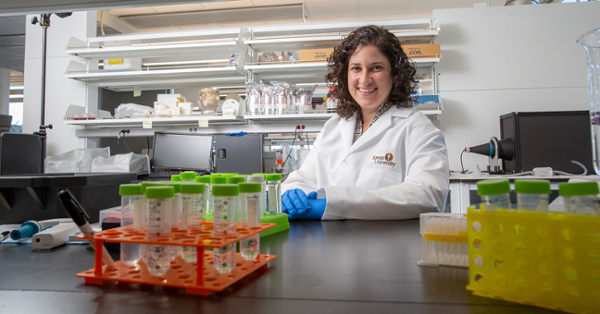NSF awards $650K to advance nanoparticle research in maternal health
NSF awards $650K to advance nanoparticle research in maternal health

While the human body’s ability to sustain life is extraordinary, many aspects of pregnancy remain poorly understood. Despite advances in medicine, the development of effective treatments for pregnancy-related conditions continues to lag behind.
Preeclampsia and related hypertensive disorders of pregnancy are potentially life-threatening conditions that contribute to rising maternal and infant mortality rates in the United States with a substantial health disparity. If left untreated, these conditions not only jeopardize pregnancy outcomes but also double the lifetime risk of cardiovascular disease and stroke for the birthing parent.
Rachel Riley, Ph.D., an assistant professor in the Department of Biomedical Engineering in the Henry M. Rowan College of Engineering, is applying her expertise in lipid nanoparticles (LNPs)—tiny, fat-based particles that can deliver therapeutics and genetic material to specific tissues—to better understand and treat pregnancy-related diseases such as preeclampsia.
“Pregnant women have historically been excluded from clinical trials due to concerns about risks to both mother and baby,” Riley said. “But this has left pregnant patients with few treatment options, a lack of studies evaluating safety of medications during pregnancy, and a limited understanding of pregnancy complications.”
With a five-year, $650,000 National Science Foundation (NSF) Faculty Early Career Development (CAREER) Award, Riley’s IMPACT Lab is exploring new ways to study and treat preeclampsia and other pregnancy-related conditions using nanoparticles.
The award enables Riley’s team to investigate placental development and its effects on maternal and fetal health, with the goal of transforming how these diseases are studied and treated.
“The placenta is an incredibly fascinating organ because it is the only tissue—aside from tumors—that develops into a fully functional organ in adulthood. When healthy, it is highly functional and well-organized, but biological dysregulation leads to adverse pregnancy outcomes” explained Riley.
Students in Riley’s lab will engage in both the design and biological aspects of the research. Graduate students will explore how to design and use lipid nanoparticles to study and treat disease, while undergraduates will help test these new formulations.
Of her mentorship style, Riley said, “I try to get students passionate about their work and empower them to make their own research decisions. I want them to take ownership and drive their projects to become independent researchers.”
Two recent doctoral graduates contributed to much of the early research in Riley’s lab: Samuel Hofbauer, now completing his medical degree at Cooper Medical School of Rowan University, and Rachel Young, who co-founded a startup with Riley called HeraNano Therapeutics.
The federal grant will also support undergraduate research opportunities through a collaboration with Rowan College of South Jersey, integrate research into coursework, and provide summer research experiences for undergraduate students. Additionally, Riley’s team will develop K–12 outreach modules to inspire the next generation of scientists.
“I know from personal experience the dire need for new therapeutic options to treat conditions of pregnancy, from conception through birth,” Riley said. “For this reason, I am extremely passionate about our research towards the goal of improving short- and long-term outcomes for both pregnant patients and their babies.”